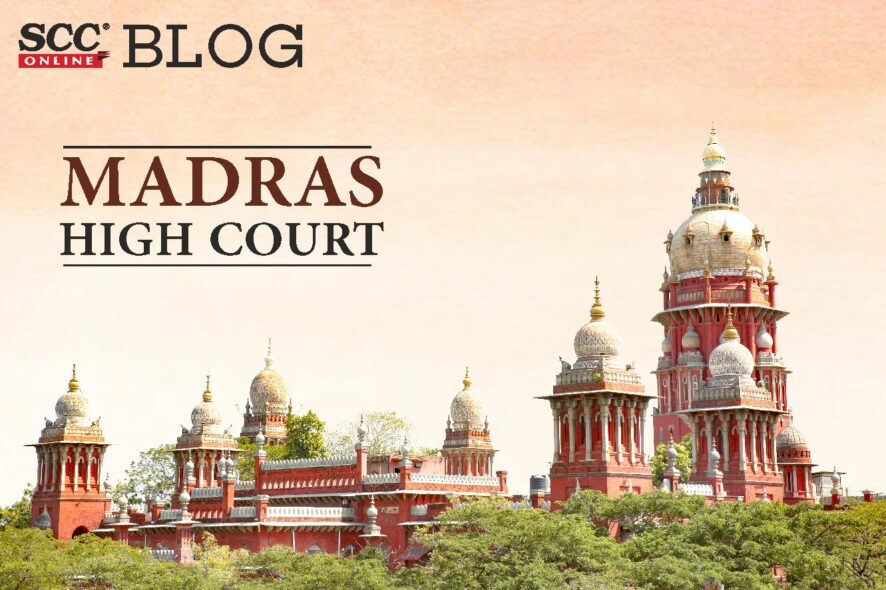Madras High Court: In a case related to a reference made by the Additional District and Sessions Judge under S. 366 Code of Criminal Procedure, 1973 for confirmation of the death sentence awarded to Kattai Raja and the criminal appeal filed by him challenging the conviction and sentence, the division bench of P. N Prakash and R. Hemalatha, JJ. held that this is yet another ‘run-of-the mill case' and not a case falling under the category of ‘rarest of rare cases' for awarding death penalty, thus, modified the punishment to life imprisonment without any remission benefits for 25 years and to pay a fine of Rs.10,000/-, and in default, to undergo rigorous imprisonment for a period of six months.
The Court noted that a horrifying murder was committed by Kattai raja aided by four of his accomplices by repeatedly attacking the victim's head and hands with a bill hook. Further, as per the FIR, the time of the complaint was 3.30 p.m., on 18.06.2013, however, the FIR reached the concerned Magistrate only at 12.30 a.m. on 19.06.2013
The Court by placing reliance on the ruling in Ravinder Kumar v. State of Punjab, (2001) 7 SCC 690, held that delayed FIR even by some hours would not by itself adversely affect the case of the prosecution and in some instances, it may not be treated fatal to the prosecution.
The Court, while taking note of all the evidence, viewed that a brutal nature of the assault has been inflicted on the victim and the wild and bizarre attack and the resultant injuries are heart rending. Further, there have been multiple fractures on the two thighs and the skull, and the neck opened up in the attack exposing the brain, blood vessels and other internal organs.
The Court took note of the ruling in Machhi Singh v. State of Punjab, (1983) 3 SCC 470, wherein the Court laid out specific grounds, like, the way of commission of homicide, crime deserving hatred in society, intensity of the crime and character of casualty of homicide, on the basis of which it can be determined if a case is falling under the umbrella of ‘rarest of rare case’ or not.
It further observed that “there is no straight-jacket formula for the ‘rarest of rare doctrine' and it can be divided into two sub-parts; aggravating circumstances and mitigating circumstances; in the instant case, the aggravating circumstances are evidently disturbing especially with having such a notorious track record and criminal background”.
Moreover, the court was of the view that in cases like the present one, the attempt to drag the legal proceedings to the maximum extent and intimidate people has been the standard modus operandi and it is disturbing to see that in the instant case, the trial commenced nine years after the murder and Kattai raja not only jumped the bail, but also went into hiding for a prolonged period during which also he was very active in committing heinous crime including murder. It also observed that “the ghastly murder in this case exhibited premeditation and meticulous execution and the attack was a calculated one to annihilate the victim”.
The Court, by applying the principles laid down in Bachan Singh v. State of Punjab (1980) 2 SCC 684), viewed that the victim himself had borrowed money from Kattai Raja knowing well his full credentials. Further, murders for disputes involving money, land and women are very common and even though this murder, was shocking, but does not come within the category of “rarest of rare cases” for awarding capital punishment. The Court reduced the punishment to imprisonment for life, with a condition that Kattai raja must not be entitled to any remission benefits for a period of 25 years in the light of the decision in Sahib Hussain Alias Sahib Jan v. State of Rajasthan (2013)9 SCC 778.
[State of Tamil Nadu v Kattai Raja, 2022 SCC OnLine Mad 4353, decided on 30.08.2022]
Advocates who appeared in this case :
For Appellants: Advocate V. Gopinath
For State: Public Prosecutor Hasan Mohamed Jinnah
Additional Public Prosecutor A.Thiruvadi Kumar
Advocate .S.Santhosh
Advocate.J.R.Archana







